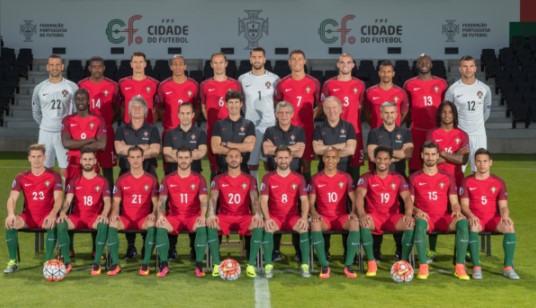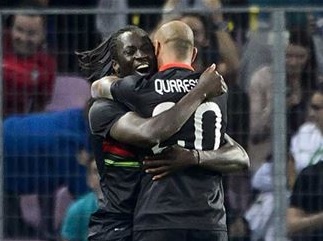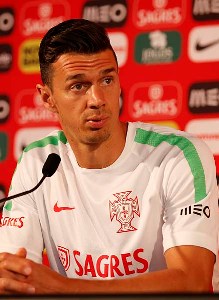 To lift the 2016 European Championship Portugal not only have to beat France. They have to beat the weight of history.
To lift the 2016 European Championship Portugal not only have to beat France. They have to beat the weight of history.
The Seleção have lost on each of the three occasions they have met Les Bleus in competitive matches, and the last ten games against their nemesis if you include friendlies. And on the five occasions Portugal have faced the host country at World Cups or Euros, in 1966 (England), 1984 (France), 2002 (South Korea), 2006 (Germany) and 2008 (Switzerland), they lost all five matches.
These facts have been widely repeated over the last few days. What is less well known is the incredible back stories of triumphing against the odds that are common to many of Portugal's squad members. Stories that shine a light on the resolve of the human spirit to overcome hardship and which lend credence to the notion that this is a very special set of players, able to rewrite the record books.
Triumphing through hardship and surviving tragedy are ingredients in abundance among the 23 players who have been representing the Seleção in France. The massive Portuguese emigrant community residing in the Euro 2016 host country ensured that Portugal would be well supported at the tournament, and many of the players’ stories will strike a chord with the hundreds of thousands of expats who left their home nation’s shores in search of a better life.
From Africa to Portugal
FC Porto’s Danilo and Sporting’s William Carvalho are vying for the holding midfielder spot in tomorrow’s final, and both players are perfect examples of the thousands of families who every year journey from Portuguese Africa to Europe seeking to improve their lot in life.
Danilo’s mother headed to the old continent to study as a nurse, leaving her son behind her in Guinea-Bissau, and only upon graduating was she able to reunite with her then 6-year-old as both settled in Mem Martins on the outskirts of Lisbon. The shy, silent, reserved boy excelled at athletics but he wanted to emulate his role model, Patrick Vieira. His physical power, tactical astuteness and rare technical ability aroused the interest of Benfica, but despite becoming an U20 World Cup runner-up in Colombia, the Lisbon club were not convinced and a delay in signing professional terms with Benfica led to a stop-start tour of Italy (Parma), Greece (Aris) and the Netherlands (Roda). It was in Madeira at Marítimo that the robust defensive midfielder found his feet before truly making his mark as an FC Porto mainstay last season.
Although from Angola, William’s story is strikingly similar. Born in Sambizanga, a rundown neighbourhood of Luanda, where the struggle for survival takes precedence over all else, he moved to Portugal a young boy, spending his adolescence playing street football amongst much older acquaintances, until joining the Mira-Sintra youth team, where his robust attacking combined with a refined technique soon got him noticed. Sporting were so determined to sign him before Lisbon rivals Benfica that Nani was enlisted to help. At just 14 years of age Sporting fan William received a phone call from his hero, who he would later befriend and become a team-mate of for both club and country.
Nani himself knows a thing of two about how football offers salvation from a desperately difficult upbringing. Son of Cape Verdean parents, he grew up in the ramshackle hill-top neighbourhood of Santa Filomena in Amadora, a sprawling suburb of Lisbon, in an area where the streets have no name. His father, Domingos, left one day for holidays in Cape Verde and never came back. His mother, Maria do Céu, left for the Netherlands seeking a better future. Nani found refuge in the arms of his aunt Antónia, and found his escape in two passions: the Brazilian martial art capoeira and football. At 9 years of age he was playing for Real Massamá, making light of having to walk eight kilometres to train in order to chase his dream. He only joined the Sporting academy at the relatively old age of 17. Three years later he was signing for Manchester United for €25 million.
 Striker Éder’s story is just as extraordinary and at the same time inspiring. He left his homeland, Guinea-Bissau, bound for Lisbon with his mother and father when he was three, but his parents’ agonising economic difficulties meant he ended up in the Lar Girassol foster home on the outskirts of Coimbra. It was there, far from his family, that a burning desire was born to be somebody in life and in football. Académica de Coimbra would be the club where he first came to prominence, enhancing his reputation further at Braga, only to have his progress halted by an anterior crucial ligament tear in his right knee. He has struggled to hit his best form since, but a revival on loan at Lille has earned Éder another shot at solving Portugal’s troublesome striker position.
Striker Éder’s story is just as extraordinary and at the same time inspiring. He left his homeland, Guinea-Bissau, bound for Lisbon with his mother and father when he was three, but his parents’ agonising economic difficulties meant he ended up in the Lar Girassol foster home on the outskirts of Coimbra. It was there, far from his family, that a burning desire was born to be somebody in life and in football. Académica de Coimbra would be the club where he first came to prominence, enhancing his reputation further at Braga, only to have his progress halted by an anterior crucial ligament tear in his right knee. He has struggled to hit his best form since, but a revival on loan at Lille has earned Éder another shot at solving Portugal’s troublesome striker position.
Their backgrounds may not be so stark, but Ricardo Quaresma and Renato Sanches certainly did not have it easy, being brought up in two of Lisbon’s underprivileged suburbs, the former in the Casal Ventoso neighbourhood at a time when it was a notorious drug dealing centre where the police were afraid to enter, and the latter in the humble surroundings of Musgueira.
In the case of goalkeeper Eduardo, it was a sudden tragic event rather than enduring economic deprivation that he had to overcome. He was just 11 when he lost his father in a road accident. Eduardo was in the car at the time of the crash. Two days later, he was in goal for Mirandela children’s team, his hometown club in Portugal’s transmontana region. While his mother and brothers emigrated to Luxemburg to try and surpass the family tragedy by starting afresh, Eduardo followed his dream, and not even rejection by FC Porto and Sporting would prevent him fighting his way to the very top, culminating in his heroic performances for Portugal in the 2010 World Cup in South Africa.
 The story of Southampton captain José Fonte’s rise to international recognition entails neither abject poverty nor family catastrophe. It is instead one long, unrelenting, grind to prove to the many doubters that he had the attributes to thrive at the top of the game. Twice released by Sporting and once by Benfica, Fonte tried his luck at a series of Portugal’s more modest clubs before, undaunted, he headed off to the lower divisions in England. He helped bring Southampton up from the third tier of English football to the promised land of the Premier League, becoming the club captain and a cult hero along the way. His Portugal debut, at 30 years old, was as late as it was just.
The story of Southampton captain José Fonte’s rise to international recognition entails neither abject poverty nor family catastrophe. It is instead one long, unrelenting, grind to prove to the many doubters that he had the attributes to thrive at the top of the game. Twice released by Sporting and once by Benfica, Fonte tried his luck at a series of Portugal’s more modest clubs before, undaunted, he headed off to the lower divisions in England. He helped bring Southampton up from the third tier of English football to the promised land of the Premier League, becoming the club captain and a cult hero along the way. His Portugal debut, at 30 years old, was as late as it was just.
Captain Cristiano Ronaldo is the undisputed leader of the squad, on and off the pitch, and his own well-documented humble background creates an affinity with his international team-mates who have had to fight every inch of the way to make it in football and in life.
Fernando Santos has forged a strong collective unit, something not always achieved by Portugal coaches in the past, no doubt drawing on the mental fortitude shown by so many of Portugal’s players on an individual basis to beat seemingly insurmountable obstacles.
That these players have made it here at all is an astonishing triumph of willpower. And, one would think, a more difficult journey than winning the final football match of Euro 2016 tomorrow.
By Tom Kundert
A version of this article was first published by Libero. Click here to find out how to subscribe to the weekly Libero football newsletter.

